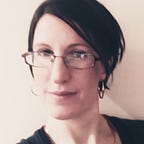It’s OK To Keep Your Vision A Secret
Some of us work better alone
You’ve heard all the standard advice about accountability partners, sharing your plans, and networking. They’re all ways in which people can achieve their dreams sooner than they could alone.
Those pieces of advice are valuable and should be used if the situation calls for them. It really depends on the nature and scale of your project.
However, as a writer, I’m first and foremost working alone. Although I have ideas and projects that extend beyond the solitude of writing, those ideas will primarily develop through my ability to refine them in words.
The disconcerting thing I noticed was that I’d been talking for years about the vague goals of “publishing a book” or “getting somewhere with my writing” with nothing to show for it. The longer that my dreams remained just dreams, I became more and more reticent to share them.
It seems that the vision develops less by sharing it and more by having a clear plan. Before I told anyone else about my ideas I should have been clear on the route to their realisation. I was unconsciously looking for permission to be myself and do what I love when I should have been granting myself that permission and building my confidence from within.
Yes, the adage of “it’s not what you know but who you know” comes into play. Someone might have the piece of information or guidance you need to complete the jigsaw. If you’re a well-connected person, you might know just the right person to help you get your ideas in order and off the ground.
Yet I’d procrastinated for years thinking I should get my entrepreneurial and people skills in order before I could claim a place as a self-employed ‘creative’. How could I do that without the marketing skills to promote myself? How could I outsource that work without a network around me? How could I find the time to work if I was diverting my energy towards building a network?
Flitting between the technicalities of business planning was a huge distraction from being myself and doing things on my terms. It was procrastination masquerading as productivity.
In side-tracking myself with all the ‘best practice’ about goal-setting and productivity (i.e. accountability partners, sharing your plans, and networking), I neglected the most important things: developing a writing habit and honing my writing skills.
I’d been led to believe that the magic happened through talking and networking. Yet the more I spoke to people about my ideas, the more confused I became. Their questions may have been useful critiques but I took them as doubts, a sure sign that I didn’t really know what I was doing. That lack of clarity rebounded to undermine my self-confidence.
If I couldn’t sum up my plan in a simple yet bold sentence, I had no place to say I was a doer rather than a dreamer. If I couldn’t clarify my dreams to another person, how was I clarifying them to myself?
“The worst enemy to creativity is self-doubt.” — Sylvia Plath
I was a writer, not an orator. The clear streams of thought that inspired my writing became muddy when I invited others to stomp through them in verbal discourse.
So, I went quiet. I decided I didn’t need the pressure of anyone else’s expectations.
And then something happened.
In that quietude, I found myself writing more, learning more, reading more, and just being more than I ever had before. I had always been an autodidact who valued both practical and emotional self-sufficiency, and now it seemed to be paying off.
Slowly, everything came together. It no longer felt like a dream but a budding reality. I spent hours upon hours putting in the work, but it hadn’t felt like work. I spontaneously found myself in flow states which resulted in tens of thousands of words being written.
In a matter of weeks, it looked like I had a loose draft of a book.
This is why so many writers seek hermitage.
In retreating from the need to ruminate with other people about the future, I found myself tapping into my own resources and wisdom. I found my need for approval gradually abating. I found a growing confidence that I had what it took to reify my vision — whatever anyone else might think of my work.
Most importantly, I reclaimed the emotional and mental space I needed to actually do the work.
I realised I was finding great joy in producing a product in my own time and own way, that I would later unveil in my own time and own way.
I was following my intuition. The idea of having someone else hold me accountable to certain pre-ordained goals now sounded thoroughly disempowering.
And the more I wrote, the more I wanted to write better. And the more I learnt about writing better, the more I wanted to share my writing. And the more I wanted to share my writing, the more I identified the ways in which I could do that.
It felt organic yet focused.
For the first time, I felt like I knew exactly what I was doing. I realised that I’d never really taken myself seriously, but now I was. And without anyone’s queries or encouragement or accountability partnership, the dream was going to come true!
Sometimes it pays off to work quietly and diligently on your own project and then — to everyone’s surprise — do the big reveal.
Frankly, no-one is interested in my half-baked plans to write a memoir, compile a poetry collection, or become an essayist. But they might be interested to hear that I’ve only gone and done it.
